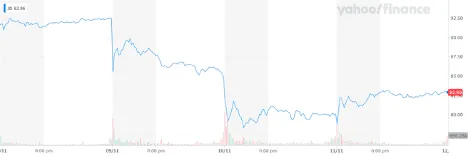China appears to be the latest nation on a mission to clamp down on the titans of the internet. In a move mirroring the US’s stance on Google and EU moves against big tech, China is following suit.
The country is proposing new regulations designed to restrict power in the higher ranks of big business. They published these on Tuesday and many tech shares fell on the news. Companies including Alibaba Group Holding Ltd (HKG: 9988), JD.Com Inc (NASDAQ: JD), Tencent Holdings Ltd(HKG: 0700), Xiaomi Corp (HKG: 1810), Ant Group and Meituan (HKG: 3690) are all tech giants that stand to suffer if the proposed regulations come to fruition.

#What is being regulated?
The regulations have been drawn up by the State Administration for Market Regulation (SAMR) and run to twenty-two pages. Its initial goal is to define anti-competitive behaviour for the tech sector in a bid to protect smaller companies. There are several areas it wants to tighten up on, such as preventing companies from sharing consumer data or selling products at a loss to undercut and ultimately push out competitors. It also stands to prevent big companies from joining forces to crush the underdogs.
Alibaba has previously been accused of forcing businesses into exclusive arrangements and punishing them if they don’t comply. One American business speaking anonymously in 2018 said:
“Based on our sales record, we should have been in a prominent position, but we were at the bottom of the page. That’s a clear manipulation of traffic. That’s a clear punishment.”
In this instance, the anonymous source said the US company was punished for opting to work with Alibaba’s rival JD.com. After choosing not to sign an exclusive contract with Alibaba, its storefront on Alibaba’s Tmall suddenly lost a lot of traffic. It was blocked from special sales and its products disappeared from search results.
A US investigation at the time led to several merchants and competitors accusing Alibaba of unfair practice. Alibaba responded to the accusations:
“Alibaba and Tmall conduct business in full compliance with Chinese laws,” Alibaba said. “Like many e-commerce platforms, we have exclusive partnerships with some of the merchants on Tmall. The merchant decides to choose such an arrangement because of the attractive services and value Tmall brings to them.”
These antitrust guidelines are in the pitch stage and open for public review and feedback until the end of the month. They also want to ensure customers are treated fairly, rather than manipulated through their data and spending habits.
#Signs of Recovery in China
This week began with financial markets around the world enjoying a stock rally. Triggered by a Joe Biden victory in the November presidential election and carried with the promising news of a pending vaccine. These events propelled the underdogs of the S&P 500 back from the brink, and although the superstar tech stocks of 2020 were initially taking a beating, they’re now showing signs of rebounding too.
Singles Day, an internet shopping discount bonanza, is the Chinese equivalent to Black Friday and Cyber Monday. This year Alibaba’s sales surged past $74 billion (£56 billion), close to doubling its previous record. Luxury goods fared particularly well, showing encouraging signs that life after Covid-19 is returning and consumer demand with it.
#Share Prices Plummet
However, there’s no doubt the pending regulations have cast a dark shadow over the success of Alibaba and its peers. Alibaba shares have fallen almost 10% this week while JD.com fell almost 17% and Tencent was briefly down 7%.

Alibaba share price fell 10% on regulatory news despite phenomenal Singles Day sales.

JD.com share price also fell as much as 17% through the week.

Tencent’s share price is fluctuating but remains down from the start of the week.
Last week, Jack Ma, Alibaba’s founder, was called in by China’s banking, securities and foreign exchange regulators. This was to discuss the effect the pending Ant Group IPO would have on the existing financial establishment. Alibaba is a major shareholder in financial services company Ant Group and Jack Ma has a considerable interest in its progress. The IPO was subsequently cancelled. From this and the proposed regulations, it’s clear the Chinese government is flexing its muscles.
Shareholders are getting nervous and it would seem rightly so. The clout and power these digital platforms wield is not going unnoticed. Alibaba and JD.com currently account for three-quarters of China’s ecommerce. These big businesses have a growing influence over Chinese consumers and have made a lot of money for shareholders in recent years. With these government moves the profit margins could be squeezed.
#Global Shift to Curb Tech Dominance
This trend seems to be drifting around the globe. Last month US authorities brought out a massive antitrust suit against Google (Alphabet Inc (NASDAQ: GOOGL)). The EU is filing antitrust charges against Amazon.com, Inc. (NASDAQ: AMZN) for a second time. Meanwhile, both France and the Netherlands are backing legislation to regulate US companies such as Apple Inc (NASDAQ: AAPL), Google, and Facebook, Inc. (NASDAQ: FB), to clamp down on anti-competitive industry practices.
Calling for the breakup of these companies could become a reality if it’s thought they’re getting too big to play fair.
#Could Blockchain Rise and Crush the Titans?
In an interesting twist to this tale of dominance, Blockchain technology has developed a network of powerful nodes that could potentially knock the tech giants off their pedestal. The technology is there and for the past three years many very intelligent individuals have been working on growing it out in the form of ventures such as Filecoin, Dfinity, or Polkadot.

Dubbed Web 3.0, these projects hinge around decentralizing companies and ensuring transparency. They are backed by prominent players, including venture capitalists, and are run by elite computer scientists. Polkadot was founded by Gavin Wood, a co-founder of Ethereum. While Dfinity is a project that could potentially replace cloud computing services and applications offered by Microsoft Corporation (NASDAQ: MSFT), Google, and Amazon.
At the moment, the advent of Web 3.0 doesn’t pose a threat. It has very few users, and most mainstream tech users would need something incredible to woo them away from their Instagram and Amazon addiction.
Nevertheless, just as Bitcoin has been gaining favour with mainstream companies like Paypal Holdings Inc (NASDAQ: PYPL) and Square Inc (NYSE: SQ), it might only take one or two big players to shift to the blockchain offerings and the tide could turn.
Whether the crackdown or displacement of big tech comes to anything remains to be seen. It’s unlikely to be an overnight shift. But if nothing else, it should serve as a reminder to investors to diversify portfolios and keep an eye on the bigger picture.
